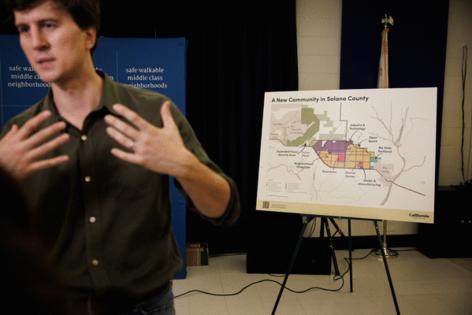Billionaires' utopia company California Forever scraps plan for ballot initiative in wake of damning report
Published in Home and Consumer News
Days after a Solano County, California, report slammed a plan backed by Silicon Valley billionaires to build a utopian new city from scratch near Fairfield, the company behind the “California Forever” project has scrapped the ballot initiative it was to put to county voters in November.
The report released late last week by Solano County said the new city was likely to cost the county billions of dollars and create substantial financial deficits, while slashing agricultural production and potentially threatening local water supplies. The project, according to the report, “may not be financially feasible.”
County supervisors on Tuesday were set to consider the report, then vote on whether to approve California Forever’s contentious plan to rezone 17,500 acres of farmland for the city, or let voters decide in November.
Instead, California Forever, led by CEO Jan Sramek, will withdraw the ballot measure — approved last month for the November election — and seek approval to amend the county’s general plan and zoning through typical county processes, California Forever said in a website update Monday morning.
California Forever, which spent more than $800 million buying more than 60,000 acres of mostly agricultural land near Fairfield, earlier last week issued its own study claiming the new city would create billions of dollars in economic activity and tens of thousands of jobs for the county. Marketing materials have depicted utopian scenes of a Mediterranean-style community, with walkable neighborhoods and a mix of businesses from retail shops to technology-company offices.
The proposal — funded by billionaire venture capitalists Marc Andreessen and Michael Moritz, LinkedIn co-founder Reid Hoffman and businesswoman Laurene Powell Jobs — has been embroiled in controversy since its real estate arm, Flannery Associates, sued holdout landowners for $510 million, claiming they conspired out of “endless greed” to inflate prices. The lawsuit, and at-times combative behavior of California Forever’s CEO Jan Sramek, added to the furor over potential loss of agricultural land and nature areas, and changes to the region’s rural character.
Mitch Mashburn, chair of the Solano County Board of Supervisors, on Monday said it was a “mistake” for California Forever to put its plan to voters without a full environmental impact report and fully negotiated development agreement. “This politicized the entire project, made it difficult for us and our staff to work with them, and forced everyone in our community to take sides,” Mashburn said in a Facebook post.
The decision to pull the plug on the ballot measure signaled that Sramek understood that “while the need for more affordable housing and good paying jobs has merit, the timing has been unrealistic,” Mashburn wrote, adding that Sramek was correct that “we cannot solve our jobs, housing, and energy challenges if every project takes a decade or more to break ground.”
Sramek said California Forever would work with the county on the environmental report and development agreement over the next two years, then seek approval from county supervisors in 2026. “With this process, we can build a shared vision that passes with a decisive majority and creates broad consensus for the future,” Sramek said in a statement on California Forever’s website.
The county’s report, issued July 18, said infrastructure such as roads for the project and public facilities like schools and parks, plus related expenses, would cost taxpayers an estimated $6.4 billion for the first phase of development, and nearly $50 billion to complete the new city. Costs to the county and the local fire-protection district would outstrip revenues, leading to millions of dollars in deficits every year, the report said. The now-withdrawn California initiative gave no clear indication of where the money would come from, the report said.
Construction, according to the report, would lead to years of “lower traveling speeds, decreased roadway safety, and increased incidence of significant injury and fatal accidents,” along with “increased wear and tear on roads and bridges will result in higher maintenance costs.” Loss of farmland would cut agricultural production by an estimated $6.7 million annually, the report said. It is unclear where California Forever would get needed surface water for the new city, according to the report.
California Forever has said its first phase would provide homes for about 50,000 residents by the late 2030s, and at least 15,000 new jobs paying at least more than $88,000 a year. Its own report, released July 16, said the project would create 53,000 to 87,000 permanent new jobs in the county and create a $44 to $54 million tax surplus for Solano County by 2040.
The ballot measure had included a requirement that costs to create the city would be paid off through tax revenue generated by the development so infrastructure, public facilities and services “must be constructed and operated at no cost to Solano taxpayers, except for those who live in the new community.”
The company said it has acquired water rights, and has ground and surface water on land it has bought, including almond orchards it plans to convert to grazing pastures. Water recycling will add to supplies, and California Forever will buy water from landowners outside the county, the company said.
Last month, the Solano Land Trust, which has close ties to Bay Area environmental groups and works with state agencies including the Coastal Conservancy and the Department of Fish and Wildlife, said the California Forever development would “have a detrimental impact on Solano County’s water resources, air quality, traffic, farmland, and natural environment.”
©#YR@ MediaNews Group, Inc. Visit at mercurynews.com. Distributed by Tribune Content Agency, LLC.








Comments